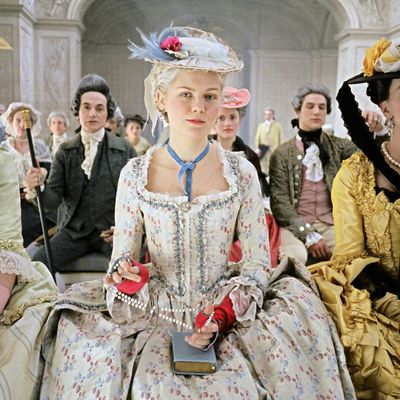
To be fair, not everyone hated Sofia Coppola’s Marie Antoinette. New York’s David Edelstein called it “one of the most immediate, personal costume dramas ever made”; 55 percent of the critics on Rotten Tomatoes sided with him, to varying degrees. But seven years later, Marie Antoinette, loosely based on the best-selling Antonia Fraser biography, is probably Coppola’s least-loved film. It’s the one that got booed at Cannes (though of course it did, Cannes is in France); it is the one that didn’t live up to Lost in Translation. And if you are anti-Sofia, then it is probably the most obvious example of her worst tendencies: style over substance, minimal plot, overprivileged young women who refuse to speak in full sentences or really at all.
I happen to love Marie Antoinette; it’s probably my second favorite of Coppola’s films, right behind Lost in Translation. And while I understand some of the criticisms (specifically the part about no one using words, ever), most of its so-called weaknesses — even that famous pair of Chuck Taylors — are the reasons I enjoy it. For all its historical trappings, Marie Antoinette is just a painfully hip period film about how annoying and fun and terrifying it is to be a teenage girl. It is a high-school movie transplanted to Versailles.
This makes Dunst’s Antoinette the Cady Heron of eighteenth-century France, though she never gets to apologize to the Baroque Tina Fey and start a new life as an everybody. In Coppola’s rereading, like in Mean Girls, our heroine is a victim of unfamiliar social expectations, of wanting to please, and, crucially, of her basic teenage desire to be cool. She wears ridiculous clothes because everyone else does. She goes to parties because she has status to maintain. Like all popular girls in movies, Marie Antoinette gets punished for these instincts; since this is based on history, she gets decapitated. But the film makes clear that Antoinette did not create her own circumstances, and it allows her — in my favorite scene, with a Dunst eye-roll that deserves its own Oscar, or at least a GIF Wall — to call the court rituals “ridiculous.” She goes along with things because she has to, and then she gets swept up in the consequences. What else was she supposed to do?, the movie suggests, which is absurd in terms of historical responsibility but makes a remarkable amount of sense to anyone who has ever been or known a tenth-grade girl.
This sympathy can rankle history buffs and Coppola naysayers, both of whom would argue that Marie Antoinette is a morally vacuous tale about a sad little rich girl. The premise — “Versailles wasn’t my fault, but it was awesome” — is certainly the largest hurdle to clear here. Still, the movie judges in its own way: The barrage of candy-colored opulence is ultimately, intentionally off-putting, and despite her weepy backstory (stolen pug, mommy issues), there’s no seeing past the superficiality of Dunst’s Antoinette. But Marie Antoinette finds both sides of the situation, which I find more engaging than, say, The Bling Ring, another Coppola teens-gone-wrong movie that seems content to mock every impulse of its characters — even relatable ones, like wanting to belong or simply have fun.
Happily, Marie Antoinette approves of fun. Holy shit, the parties in this movie. Champagne towers! Laduree pastries on every surface. Four-foot wigs powdered with blow. Admittedly, I will watch any film with a corset budget, but Marie Antoinette makes your average costume drama look like the local news reel from a Halloween parade. Then it ignores basically every Merchant-Ivory rule about sex, drugs, or crashing a masked ball because you’re young and you feel like it. Society still trumps all, but Marie Antoinette puts a 16-year-old girl in charge of society, and then lets her run wild. It’s the “no parents” teen dream, but in a real live palace, filled with cool shoes and people who will cater to your every whim.
Which doesn’t work out, obviously. It is easier to enjoy Marie Antoinette’s frivolity when you know where it is headed (the guillotine); the whole undertaking feels like one last party before the grown-ups come home and real life kicks in. Yes, the party goes on too long — I am still not sure why we have to watch Kirsten Dunst run around the woods for twenty minutes, though I’m guessing it has something to do with Walden Pond and personal growth. I zone out during that part, because “growth” and “nature” aren’t really the point of Marie Antoinette (nor is paying full attention to anyone or anything). It is mostly about getting to feel like a Mean Girl for two hours, and still getting to punish the Mean Girl. It is about letting us have cake and eat it, too. (With all apologies to history.)

